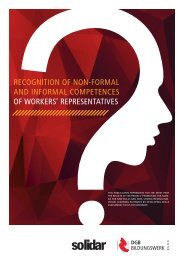Promoting community-based initiatives for social inclusion ... - Solidar
Promoting community-based initiatives for social inclusion ... - Solidar
Promoting community-based initiatives for social inclusion ... - Solidar
Create successful ePaper yourself
Turn your PDF publications into a flip-book with our unique Google optimized e-Paper software.
Supporting local actors <strong>for</strong> <strong>inclusion</strong><br />
In Montenegro there is not a long-standing<br />
tradition of civil society organisation (CSO)<br />
existence. The first CSOs appeared in<br />
conjunction with the creation of the multi-party<br />
system only a decade ago. Today, according to<br />
the Ministry of Justice‟s register, there are close<br />
to 4,400 registered CSOs, out of which only<br />
around 100 function as real non-governmental<br />
actors, on which basis one can conclude that<br />
only a small number of NGOs function in<br />
accordance with the law. A percentage of<br />
funding comes from government institutions but<br />
this amount is relatively small in comparison with<br />
<strong>for</strong>eign donations. Financial support from<br />
municipal authorities has a minor impact on local<br />
civil <strong>initiatives</strong> which further undermines the<br />
overall economic sustainability of the CSOs.<br />
standards. The home tries to give them warm<br />
and neat surroundings, preparing traditional<br />
meals and organising lots of activities so that<br />
their clients feel as good as possible.<br />
Several hundred people have lived or are<br />
living in the institution.<br />
It has established itself as one of the leaders<br />
in care of older people in the region.<br />
It employees 13 people and has 35 beds.<br />
The employees have been taught by highly<br />
qualified people from Arbeiterwohlfahrt.<br />
It has institutional cooperation with<br />
institutions from the EU.<br />
Relations between the government and civil<br />
society are contentious, but have been improving<br />
in recent years. The government now relies on<br />
NGOs <strong>for</strong> preparing laws, co-sponsoring<br />
education, campaigns and sharing the burden of<br />
<strong>social</strong> services provision. Several municipalities<br />
have signed cooperation agreements with local<br />
NGOs. In addition, in 2007 a Code of Conduct<br />
<strong>for</strong> NGOs was adopted resulting from a joint<br />
ef<strong>for</strong>t of 250 NGOs. However, public institutions<br />
do not respond positively to criticism from CSOs<br />
and sometimes exclude those who tend to be too<br />
critical. Equally, opposition parties often refuse to<br />
cooperate with CSOs under the pretext that they<br />
are too much influenced by the government.<br />
CASE STUDY 10: ‘STARAČKI DOM SANA’ -<br />
HOME FOR ELDERLY PEOPLE AND PEOPLE<br />
NEEDING ASSISTANCE<br />
By AWO Subotica Serbia<br />
Project Goals<br />
„Starački Dom Sana‟ - a home <strong>for</strong> elderly people<br />
and people needing assistance - was founded in<br />
2003 and started functioning in 2004. Its main<br />
aim is to help elderly people and people needing<br />
assistance to get the help and care that they<br />
deserve, and that this care is of the highest<br />
standard. „Starački Dom Sana‟ was founded as a<br />
result of the necessity <strong>for</strong> such a institution in<br />
Una Sana Kanton.<br />
Results<br />
The home works with the concept that the<br />
people should feel like they are at home, in their<br />
families. It tries to get away from the institutional<br />
way of life, where is cold and there are no<br />
<strong>Promoting</strong> <strong>community</strong>-<strong>based</strong> <strong>initiatives</strong> <strong>for</strong> <strong>social</strong> <strong>inclusion</strong> in Western Balkans | 19
















